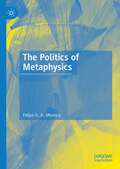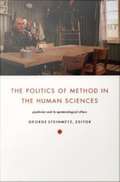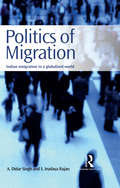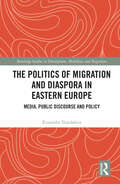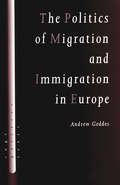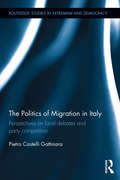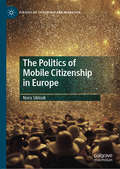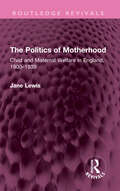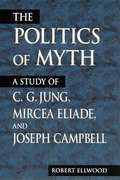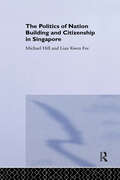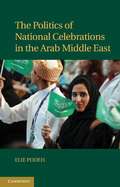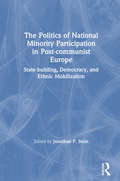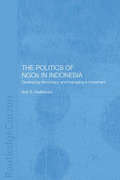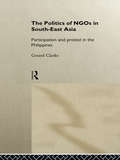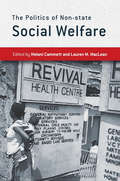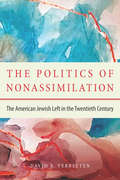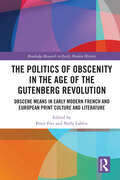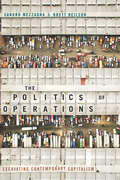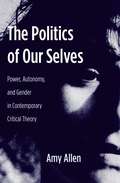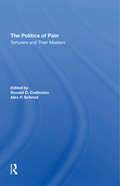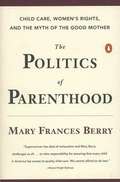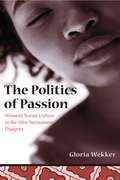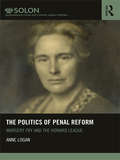- Table View
- List View
The Politics of Metaphysics
by Felipe G. MoreiraSince immemorial times, persons have been engaged in disputes in metaphysics. This book reacts to this fact by supporting five theses. Thesis 1 is that disputes are micro-wars that have a significant social importance; they involve conflicting parties who may resort to some kind of violence and depend on normative factors. Thesis 2 is that disputes can be approached from right-wing or left-wing stances. Thesis 3 is that the grounds for endorsing an approach to a dispute are problematic starting points that may be rationally rejected. Thesis 4 is that disputes have an incommensurable greatness. Thesis 5 is that right-wing approaches to disputes may be less appealing than the left-wing one championed by the book for those who endorse that one is to avoid expressing “subtle” violence. This is the violence expressed by those who suggest that others who disagree with one’s criteria to deal with disputes fall short of logos or act as if such others did not exist.
The Politics of Method in the Human Sciences: Positivism and Its Epistemological Others
by George SteinmetzThe Politics of Method in the Human Sciences provides a remarkable comparative assessment of the variations of positivism and alternative epistemologies in the contemporary human sciences. Often declared obsolete, positivism is alive and well in a number of the fields; in others, its influence is significantly diminished. The essays in this collection investigate its mutations in form and degree across the social science disciplines. Looking at methodological assumptions field by field, individual essays address anthropology, area studies, economics, history, the philosophy of science, political science and political theory, and sociology. Essayists trace disciplinary developments through the long twentieth century, focusing on the decades since World War II. Contributors explore and contrast some of the major alternatives to positivist epistemologies, including Marxism, psychoanalysis, poststructuralism, narrative theory, and actor-network theory. Almost all the essays are written by well-known practitioners of the fields discussed. Some essayists approach positivism and anti-positivism via close readings of texts influential in their respective disciplines. Some engage in ethnographies of the present-day human sciences; others are more historical in method. All of them critique contemporary social scientific practice. Together, they trace a trajectory of thought and method running from the past through the present and pointing toward possible futures. Contributors. Andrew Abbott, Daniel Breslau, Michael Burawoy, Andrew Collier , Michael Dutton, Geoff Eley, Anthony Elliott, Stephen Engelmann, Sandra Harding, Emily Hauptmann, Webb Keane, Tony Lawson, Sophia Mihic, Philip Mirowski, Timothy Mitchell, William H. Sewell Jr. , Margaret R. Somers, George Steinmetz, Elizabeth Wingrove
Politics of Migration: Indian Emigration in a Globalized World
by S. Irudaya Rajan A. Didar SinghThis book studies the politics surrounding Indian emigration from the 19th century to the present day. Bringing together data and case studies from across five continents, it moves beyond economic and social movers of migration, and explores the role of politics—both local and global—in shaping diaspora at a deeper level. The work will be invaluable to scholars and students of migration and diaspora studies, development studies, international politics, and sociology as well as policy-makers, and non-governmental organizations in the field.
The Politics of Migration and Diaspora in Eastern Europe: Media, Public Discourse and Policy (Routledge Studies in Development, Mobilities and Migration)
by Ruxandra TrandafoiuThis book provides a critical analysis of the politics of migration in Eastern Europe and an in-depth understanding of the role played by media and public discourse in shaping migration and migration policy. Ruxandra Trandafoiu looks at emigration, diaspora, return, kin-minority cross-border mobility, and immigration in Eastern Europe from cultural, social and political angles, tracing the evolution of migration policies across Eastern Europe through communication, public debate and political strategy. Trandafoiu investigates the extent to which these potential ‘models’ or policy practices can be comparable to those in Western European countries, or whether Eastern Europe can give rise to a migration ‘system’ that rivals the North American one. Each chapter bridges the link between policy and politics and makes a case for considering migration politics as fundamentally intertwined with media representation and public debate. Drawing on comparative case studies of countries including Bulgaria, Croatia, Estonia, Hungary, Poland, Romania, Slovakia and Ukraine, the book considers how migration is both managed and experienced from political, social and cultural viewpoints and from the perspectives of a range of actors including migrants, politicians, policymakers and journalists. This book will be key reading for advanced students and researchers of migration, media, international relations, and political communication.
The Politics of Migration and Immigration in Europe
by Andrew GeddesThis text fulfills a major gap by comprehensively reviewing one of the most salient policy issues in Europe today, migration and immigration. It is the first book to address the question of whether we can legitimately speak of a European politics of migration that links states in terms of their policy response to each other and to an evolving EU policy. The book carefully differentiates between different types of migration, introduces the main concepts and debates, and provides a broad comparative framework from which to assess the role and impact of individual states and the European Union (EU) and European integration to this key contemporary issue. Topical and up-to-date, the author fully reviews the politics and policies of immigration across the breadth and depth of Europe including the `older' immigration countries of France, Germany and the United Kingdom, the `newer' southern European countries, and the enlargement states of East and Central Europe. The Politics of Immigration and Migration in Europe is essential reading for all undergraduate and post-graduate students of European politics, political science and the social sciences more generally. Andrew Geddes lectures at the School of Politics and Communications Studies, University of Liverpool. `This book will be essential reading for students of migration and European integration, but will also be important for decision-makers, and, indeed, anyone who wants to understand one of the burning issues of our times' - Stephen Castles, Professor of Migration and Refugee Studies, Director of the Refugee Studies Centre, University of Oxford
The Politics of Migration in Italy: Perspectives on local debates and party competition (Extremism and Democracy)
by Pietro Castelli GattinaraMigration represents one of the key issues in both Italian and European politics, and it has triggered EU-wide debates and negotiations, alongside alarmist and often sensationalist news reporting on the activities of government, party and social movement actors. The Politics of Migration in Italy explores what happens when previously undiscussed issues become central to political agendas and are publicly debated in the mass media. Examining how political actors engage with the issue of migration in electoral campaigning, this book highlights how complex policy issues are addressed selectively by political entrepreneurs and how the responses of political actors are influenced by strategic incentives and ongoing events. This book studies the dynamics of the politicization of the immigration issue across three local contexts in Italy – Prato, Milan and Rome – which differ systematically with respect to crucial economic, cultural and security dimensions of immigration. Offering an innovative exploration of party competition and migration in Italy, as well as providing the conceptual and analytical tools to understand how these dynamics play out beyond the Italian case, this book is essential reading for students, scholars and policymakers working in the areas of migration studies, agenda-setting and European politics more generally.
The Politics of Mobile Citizenship in Europe (Politics of Citizenship and Migration)
by Nora SiklodiThe Politics of Mobile Citizenship in Europe explores contemporary models of national and European Union (EU) citizenship in the context of intra-EU mobility. Scholars have often addressed these models from separate disciplinary standpoints. National citizenship has been studied through the prism of citizenship studies and EU citizenship from an EU studies viewpoint. To contribute to their ongoing discussion and offer a politically embedded perspective, Siklodi applies the citizenship studies lens to the analysis of EU-wide survey data and original focus group evidence of young and highly educated EU mobiles and stayers in Sweden and Britain. Specifically, she investigates political community building processes, including processes of differentiation and exclusion, and the dimensions of citizenship – identity, rights and participation – at the national and EU levels. Siklodi proposes a redefinition of the active/passive citizen dichotomy in terms of mobiles/stayers to provide a more accurate description of contemporary citizen attitudes and behaviours across the European community.
The Politics of Motherhood: Child and Maternal Welfare in England, 1900-1939 (Routledge Revivals)
by Jane LewisDuring the early twentieth century maternal and child welfare became a national issue for the first time. The child and maternal welfare movement had a significant material and ideological effect on women and it is therefore important to understand the mechanisms which structured and controlled it.Originally published in 1980, The Politics of Motherhood asks why child and maternal welfare policy took the particular form that it did during the Edwardian and inter-war years and in doing so brings together a number of important themes relating to women and social policy. By taking into account not only the professionals involved, but also the mothers themselves – their reactions to the policies implemented and their own demands for change, the study brings to the forefront such themes as the relation between health and the family economy, the control of health care and the control of reproduction. Many issues arising from these themes were of present-day interest at the time, and still are today, such as the medicalisation of childbirth which has involved a loss of control by women over its management. This study illustrates the importance of stopping to examine the pedigree of our social policies and the need to ask whether a policy developed under one specific set of social, economic and political conditions can continue to be relevant in a markedly different situation.
The Politics of Museums (New Directions in Cultural Policy Research)
by Clive GrayThis is the first book to examine how and why museums are political institutions. By concentrating on the ways in which power, ideology and legitimacy work at the international, national and local levels of the museum experience, Clive Gray provides an original analysis of who exercises power and how power is used in museums.
The Politics of Myth: A Study of C. G. Jung, Mircea Eliade, and Joseph Campbell
by Robert EllwoodEllwood (Religion, U. of Southern California) delves into the political views implicit in the mythological theories of probably the three best-known popularizers of myth in the 20th century. He points that all three emerged from the anti-modern pessimism and romanticism that also generated European fascism, and have all been accused of holding fascists and anti-Semitic sentiments. He assesses those charges in light of their entire career and lifetime contribution.
The Politics of Nation-Building
by Harris MylonasWhat drives a state's choice to assimilate, accommodate or exclude ethnic groups within its territory? In this innovative work on the international politics of nation-building, Harris Mylonas argues that a state's nation-building policies toward non-core groups – individuals perceived as an ethnic group by the ruling elite of a state – are influenced by both its foreign policy goals and its relations with the external patrons of these groups. Through a detailed study of the Balkans, Mylonas shows that how a state treats a non-core group within its own borders is determined largely by whether the state's foreign policy is revisionist or cleaves to the international status quo, and whether it is allied or in rivalry with that group's external patrons. Mylonas injects international politics into the study of nation-building, building a bridge between international relations and the comparative politics of ethnicity and nationalism.
The Politics of Nation Building and Citizenship in Singapore (Politics in Asia)
by Michael Hill Kwen Fee LianSince independence in 1965 Singapore has strengthened its own national identity through a conscious process of nation-building and promoting the active role of the citizen within society. Singapore is a state that has firmly rejected welfarism but whose political leaders have maintained that collective values, instead of those of autonomous individuals, are essential to its very survival.The book begins by examining basic concepts of citizenship, nationality and the state in the context of Singapore's arrival at independence. The theme of nation-building is explored and how the creation of a national identity, through building new institutions, has been a central feature of political and social life in Singapore. Of great importance has been education, and a system of multilingual education that is part of a broader government strategy of multiculturalism and multiracialism; both have served the purpose of building a new national identity. Other areas covered by the authors include family planning, housing policy, the creation of parapolitical structures and the imporatnce of shared `Asian values' amongst Singapore's citizens.
The Politics of National Celebrations in the Arab Middle East
by Elie PodehWhy do countries celebrate defining religious moments or significant events in their history, and how and why do their leaders select certain events for commemoration and not others? This book is the first systematic study of the role of celebrations and public holidays in the Arab Middle East from the fall of the Ottoman Empire to the present. By tracing the history of the modern nation-state through successive generations, the book shows how Arab rulers have used public holidays as a means of establishing their legitimacy and, more broadly, a sense of national identity. Most recently, some states have attempted to nationalize religious festivals in the face of the Islamic revival. With its many illustrations and copious examples from across the region, the book offers an alternative perspective on the history and politics of the Middle East.
The Politics of National Minority Participation in Post-communist Societies: State-building, Democracy and Ethnic Mobilization
by Jonathan SteinWith the upsurge of nationalist sentiment in post-communist societies, the problem of political rights for ethnic minorities became a dangerous flashpoint. The introduction of electoral competition, the rewriting of constitutions, the breakup of federations, the weakness of civic institutions, and the social and economic dislocations associated with marketization have all contributed to the salience of majority-minority relations. This collection systematically analyzes different models of minority politics in Eastern Europe, in an effort to understand why tensions are manageable in some contexts, uncontainable in others. Anchoring the volume are essays by Carlos Flores Juberias on electoral systems, and Janusz Bugajski on national minority parties. Six case studies examine the interaction of different types of institutional arrangements (which structure political participation) and different demographic conditions (ethnic balances and territorial concentrations) in Albania, Bulgaria, Croatia, Estonia, Latvia, and Romania. Framing these studies are overviews by the editors and by Jack Snyder.
The Politics of NGOs in Indonesia: Developing Democracy and Managing a Movement (Rethinking Southeast Asia)
by Bob S. HadiwinataThis book deals with two major issues: how Indonesian NGOs survived under Suharto's authoritarian rule; and how NGOs contributed to the promotion of democracy in the post-Suharto era. If NGOs are to change from 'development' to 'movement' in democratic post-Suharto Indonesia, they must adjust not only their management and working style, but also their very ideology. This comprehensive study will be an important book for scholars interested in Asian studies, Indonesian politics and development studies.
The Politics of NGOs in Southeast Asia: Participation and Protest in the Philippines (Politics in Asia)
by Gerard ClarkeThe Politics of NGOs in Southeast Asia traces the history of the emergence of NGOs in the Philippines and southeast Asia and the political factors which encouraged this. The main focus is on the period from the mid-1990s when NGOs first became a notable force in the region. It documents the complex relations between NGOs and other political actors including the state, organised religion, foreign donors, the business sector and underground insurgent groups and their impact on NGO strategy.
The Politics of Non-state Welfare
by Lauren M. Maclean Melani CammettAcross the world, welfare states are under challenge (or were never developed extensively in the first place) while non-state actors increasingly provide public goods and basic welfare. In many parts of the Middle East and South Asia, sectarian organizations and political parties supply basic services to ordinary people more extensively and effectively than governments. In sub-Saharan Africa, families struggle to pay hospital fees, and nongovernmental organizations (NGOs) launch welfare programs as states cut subsidies and social programs. Likewise, in parts of Latin America, international and domestic NGOs and, increasingly, private firms are key suppliers of social welfare in both urban and rural communities. Even in the United States, where the welfare state is far more developed, secular NGOs and faith-based organizations are critical components of social safety nets. Despite official entitlements to public welfare, citizens in Russia face increasing out-of-pocket expenses as they are effectively compelled to seek social services through the private market.In The Politics of Non-state Social Welfare, a multidisciplinary group of contributors use survey data analysis, spatial analysis, in-depth interviews, and ethnographic and archival research to explore the fundamental transformation of the relationship between states and citizens. The book highlights the political consequences of the non-state provision of social welfare, including the ramifications for equitable and sustainable access to social services, accountability for citizens, and state capacity. The authors do not assume that non-state providers will surpass the performance of weak, inefficient, or sometimes corrupt states but instead offer a systematic analysis of a wide spectrum of non-state actors in a variety of contexts around the world, including sectarian political parties, faith-based organizations, community-based organizations, family networks, informal brokers, and private firms.Contributors: Scott Allard, University of Chicago; Jennifer N. Brass, Indiana University; Melani Cammett, Brown University; Linda Cook, Brown University; Ian Gough, London School of Economics; Michael Jennings, School of Oriental and African Studies; Anirudh Krishna, Duke University; Pauline Jones Luong, University of Michigan; Lauren M. MacLean, Indiana University; Alejandra Mizala, University of Chile; Alison Post, University of California, Berkeley; Ben Ross Schneider, Massachusetts Institute of Technology.
The Politics of Nonassimilation: The American Jewish Left in the Twentieth Century
by David VerbeetenOver the course of the twentieth century, Eastern European Jews in the United States developed a left-wing political tradition. Their political preferences went against a fairly broad correlation between upward mobility and increased conservatism or Republican partisanship. Many scholars have sought to explain this phenomenon by invoking antisemitism, an early working-class experience, or a desire to integrate into a universal social order. In this original study, David Verbeeten instead focuses on the ways in which left-wing ideologies and movements helped to mediate and preserve Jewish identity in the context of modern tendencies toward bourgeois assimilation and ethnic dissolution. Verbeeten pursues this line of inquiry through case studies that highlight the political activities and aspirations of three "generations" of American Jews. The life of Alexander Bittelman provides a lens to examine the first generation. Born in Ukraine in 1892, Bittelman moved to New York City in 1912 and went on to become a founder of the American Communist Party after World War I. Verbeeten explores the second generation by way of the American Jewish Congress, which came together in 1918 and launched significant campaigns against discrimination within civil society before, during, and especially after World War II. Finally, he considers the third generation in relation to the activist group New Jewish Agenda, which operated from 1980 to 1992 and was known for its advocacy of progressive causes and its criticism of particular Israeli governments and policies. By focusing on individuals and organizations that have not previously been subjects of extensive investigation, Verbeeten contributes original research to the fields of American, Jewish, intellectual, and radical history. His insightful study will appeal to specialists and general readers interested in those areas.
The Politics of Obscenity in the Age of the Gutenberg Revolution: Obscene Means in Early Modern French and European Print Culture and Literature
by Peter Frei Nelly LabèreWhat does obscene mean? What does it have to say about the means through which meaning is produced and received in literary, artistic and, more broadly, social acts of representation and interaction? Early modern France and Europe faced these questions not only in regard to the political, religious and artistic reformations for which the Renaissance stands, but also in light of the reconfiguration of its mediasphere in the wake of the invention of the printing press. The Politics of Obscenity brings together researchers from Europe and the United States in offering scholars of early modern Europe a detailed understanding of the implications and the impact of obscene representations in their relationship to the Gutenberg Revolution which came to define Western modernity.
The Politics of Operations: Excavating Contemporary Capitalism
by Sandro Mezzadra Brett NeilsonIn The Politics of Operations Sandro Mezzadra and Brett Neilson investigate how capital reshapes its relation with politics through operations that enable the extraction and exploitation of mineral resources, labor, data, and cultures. They show how capital—which they theorize as a direct political actor—operates through the logistical organization of relations between people, property, and objects as well as through the penetration of financialization into all realms of economic life. Mezzadra and Neilson present a capacious analysis of a wide range of issues, from racial capitalism, the convergence of neoliberalism and nationalism, and Marx's concept of aggregate capital to the financial crisis of 2008 and how colonialism, empire, and globalization have shaped the modern state since World War II. In so doing, they illustrate the distinctive rationality and logics of contemporary capitalism while calling for a politics based on collective institutions that exist outside the state.
The Politics of Our Selves: Power, Autonomy, and Gender in Contemporary Critical Theory (New Directions in Critical Theory #43)
by Amy AllenSome critical theorists understand the self as constituted by power relations, while others insist upon the self's autonomous capacities for critical reflection and deliberate self-transformation. Up to now, it has all too often been assumed that these two understandings of the self are incompatible. In her bold new book, Amy Allen argues that the capacity for autonomy is rooted in the very power relations that constitute the self. Allen's theoretical framework illuminates both aspects of what she calls, following Foucault, the "politics of our selves." It analyzes power in all its depth and complexity, including the complicated phenomenon of subjection, without giving up on the ideal of autonomy. Drawing on original and critical readings of a diverse group of theorists, including Michel Foucault, Jurgen Habermas, Judith Butler, and Seyla Benhabib, Allen shows how the self can be both constituted by power and capable of an autonomous self-constitution. Her argument is a significant and vital contribution to feminist theory and to critical social theory, both of which have long grappled with the relationship between power and agency.If critical theory is to be truly critical, Allen argues, it will have to pay greater attention to the phenomenon of subjection, and will have to think through the challenges that the notion of subjection poses for the critical-theoretical conception of autonomy. In particular, Allen discusses in detail how the normative aspirations of Habermasian critical theory need to be recast in light of Foucault's and Butler's account of subjection. This book is original both in its attempt to think of power and autonomy simultaneously and in its effort to bring the work of Foucault and Habermas into a productive dialogue.
The Politics Of Pain: Torturers And Their Masters
by Ronald D Crelinsten Alex SchmidAlthough a wave of democratization appears to be sweeping the globe, torture persists in more than seventy-five nations. Despite widespread condemnation of torture and the efforts of international and nongovernmental organizations to end it, the "politics of pain" continues in a broad range of social and political systems. This book is one of the first to systematically examine the psychological, cultural, and social origins of torture. It provides profiles of torturers and of those who direct them in their brutal activities. The contributors provide case studies from the past and present, including Somoza's National Guard in Nicaragua and regimes in the Southern Cone of Latin America and in Greece.
The Politics of Parenthood: Child Care, Women's Rights, and the Myth of the Good Mother
by Mary Frances BerryIn a landmark, historical perspective on parenthood in America, the author of Why ERA Failed reveals how recent our definition of "good" parenting really is, and argues that what matters is not who cares for the children, but the quality of the care.
The Politics of Passion: Women's Sexual Culture in the Afro-Surinamese Diaspora (Between Men-Between Women: Lesbian and Gay Studies)
by Gloria WekkerGloria Wekker analyzes the phenomenon of mati work, an old practice among Afro-Surinamese working-class women in which marriage is rejected in favor of male and female sexual partners. Wekker vividly describes the lives of these women, who prefer to create alternative families of kin, lovers, and children, and gives a fascinating account of women's sexuality that is not limited to either heterosexuality or same-sex sexuality. She offers new perspectives on the lives of Caribbean women, transnational gay and lesbian movements, and an Afro-Surinamese tradition that challenges conventional Western notions of marriage, gender, identity, and desire. Bringing these women's voices to the forefront, she offers an extensive and groundbreaking analysis of the unique historical, religious, psychological, economic, linguistic, cultural, and political forces that have shaped their lives.
The Politics of Penal Reform: Margery Fry and the Howard League (Routledge SOLON Explorations in Crime and Criminal Justice Histories)
by Anne LoganIn the context of recent media scrutiny on the state of prisons in the UK, the efficacy of incarcerating large numbers of offenders is an issue which is rising steadily up the political agenda. In 2016, the Howard League for Penal Reform – an organization that has energetically lobbied for improvements in the treatment of offenders throughout its lifetime – celebrated its 150th anniversary. This book considers the life and work of Margery Fry, the woman who created the modern Howard League and dominated it from 1918 until her death in 1958, and places the UK’s oldest surviving penal reform pressure group and its current work into their historical context. It examines Fry’s legacy as a campaigner for an international standard of prisoners’ minimum rights, which resulted in a United Nations charter, for the introduction of compensation for victims of criminal injuries, and for the abolition of the death penalty, and also considers her role in the establishment of criminology as an academic discipline and her organization of the first criminology lectures in Great Britain. It is essential reading for all those engaged in prisons research, penal reform and criminal justice history.
